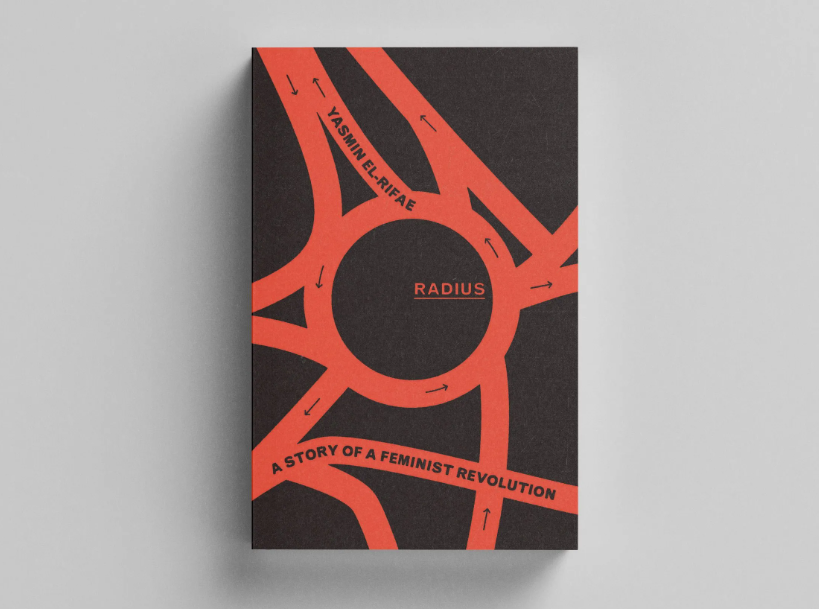“This is just one telling of a very real history; within and around it, there are countless others,” reads the introduction to Yasmin El-Rifae’s ‘Radius: A Story of Feminist Revolution’ (2022).
The book, which had its first Egyptian launch event on 2 March 2023, recounts one facet of a pivotal moment in feminist history. In late 2012, shocking reports emerged of mass sexual violence against women protesters in Tahrir Square.
While aggressions had been carried out against women since the early days of the uprising, two years into the revolution, these mob sexual assaults had grown to an unprecedented scale and viciousness.
The mounting epidemic prompted the formation of several feminist groups, organizing to document and halt violences, extract women from these attacks, and provide care to survivors.
‘Radius’ tells the story of one such group: Operation Anti-Sexual Harassment, or ‘Opantish’ for short, of which the author was a member.
El-Refaie’s first book is a difficult read. Comprising interviews with activists, Facebook posts, and the author’s own recollections, the stories it tells paint a harrowing portrait of patriarchal violence, feminist resistance, and defeat.
The product is a powerful work of literature – its sobering account unfolds with poetic precision and zeal; but there is no easing into the turmoil of this graphic retelling.
From the onset, ‘Radius’ makes clear the heightened stakes underlying its protagonists’ every gesture. Its first chapter begins on 25 January 2013, the second anniversary of the revolution. The day’s events are broken down into timestamps; a clinically ordered chronology, sharply contrasting with the chaos of the scenes.
At 11 AM, T, a member of Opantish, slips into an elaborate combination of long johns under a one-piece swimsuit, topped with several more layers of clothing, before heading to Tahrir Square. The restriction of her makeshift armor, “normally uncomfortable, was now reassuring.”
Clothing becomes protective, strategic – in the heart of clashes, the group’s stenciled t-shirts are often the only way to distinguish allies from predators.
At 7 PM, Marwan, another member of the group, is attacked by a fellow volunteer who fails to recognize him after his Opantish t-shirt is ripped by a knife he does not see. At 8 PM, injured victims and activists crowd into the group’s operations room, in an apartment near the square.
At midnight, El-Rifae comes across a group of male protestors on her walk home, pondering the threat they may or may not pose. “I was no longer sure how many sides there were, who was on which side, if any of them were on ours,” she recalls.
The question points to what is perhaps the most terrifying aspect of these assaults – the facelessness of their perpetrators.
Page after page, the source of violence against women in the square remains largely intractable. In the group’s early days, members of Opantish believed that the attacks had been orchestrated by forces opposed to the protests.
Years later, the author and her interviewees have largely traded this view in favor of a harsher truth: that while paid thugs may have played a part in the chaos, ordinary men – some of whom stood on the frontlines of protests against injustice – were also capable of assault.
Throughout the book, it remains clear that misogyny runs deeper than any one group or ideology. As one of El-Rifae’s interviewees puts it, “I think it’s from the heart of society.”
Patriarchy beyond the binaries
Writing for the Cairo Review, Miwa Kato observed the polarizing lenses through which Egyptian women are depicted in the media.
“There are the powerful images of numerous women participating in the Tahrir Square uprising that ended decades of despotic rule… On the other hand, there are the other images from Tahrir Square, of women protesters publicly assaulted in gender-based violence,” she notes.
While Radius is exceptionally graphic in its accounts of sexual assault, the book is also able to look beyond the above binaries of victimhood and survival.
In one chapter, Egyptian musician and women’s rights activist Yasmine El Baramawy gives a televised account of the assault she experienced in Tahrir Square. Conscious of the weight of her testimony, she is careful not to “show defeat or self-pity. She would not show anger. That was up to them – the people watching.”
At the interview’s outcome, her father, initially opposed to the appearance, texts her to express his pride at her strength. He also conveys the admiration of relatives and fellow men watching the broadcast from a cafe, whose reactions signal the early ripples of social change.
Like other women in the book, El Baramawy is both a victim of harrowing violence, and a catalyst for widespread upheaval – her testimony would send shockwaves through mainstream perceptions of sexual assault, becoming one of many to emerge in the following months.
Not all viewers, however, share the same empathy for her account.
“You want your moment in front of the cameras so much that you’re willing to make us all look bad? You want to shit on the revolution?” asks one male comrade in a later passage. This prominent revolutionary bears the mark of sacrifice in the empty sockets from which his eyes were displaced by shotgun pellets in 2011.
‘Radius’ does not shy from this duality, nor does it lean into the impulse to view the world through neat categories of good and evil. While it makes no excuse for predators, the book does not place the onus for sexual violence solely on their shoulders.
In one scene, a male volunteer approaches a presumed perpetrator during a mass assault, pretending to believe he is there to help the victim. For an instant, the man’s face is extracted from the mass, “head jerked backward, as though he had been sprayed with cold water.”
The gesture affords him more humanity than his own mob thinking could allow for – seconds later, the same man is helping activists fray their way through the crowd. His intentions are by no means selfless: given the chance to become a hero, he chooses momentary glory over the nameless shadow of crime. Yet, what the exchange also points to is the flipside of patriarchy.
As Tareq Baconi notes in his review of the book for The Baffler, “The reader is asked to hold the truth that the perpetrators of sexual violence in Tahrir Square are also victims of imperial violence and that maybe, even, there is a causal link between the two.”
Transnational geographies of survival
In one passage, El-Rifae looks back on her own adolescence in the East Cairo neighborhood of Nasr City; its very streets reminiscent of power and constriction, with landmark buildings “each heavily fortified, often surrounded by concrete walls topped with barbed wire.”
The dynamics she describes may ring familiar to many readers: explicit advances from drivers while waiting for her bus; battling her family for benign freedoms; or what she calls the “double-lives” of Egyptian women, whose small rebellions are tolerated so long as they unfold behind closed doors.
To me, some of the most striking parts of ‘Radius’ were those evoking the battle for mobility in a nominally conservative society, less preoccupied with ‘morality’ than with upholding the veil of purity – be it through the policing of women’s dress or its hyperfixation on the hymen.
While it never shies from depicting the woes of misogyny, the book avoids the pitfall of painting them as the sole ground of a stagnant, backward Arab world; or what Gayatri Spivak describes as the colonial impulse to ‘save brown women from brown men.’
From Nasr City, the author transports readers to Palestine, where she helped organize several editions of a literature festival in the 2010s.
She recounts taking artists and writers from different countries on a bus ride through the segregated landscape of apartheid, noting that “Black and Indigenous guests read and understood this geography of power faster, more matter-of-factly than the rest.”
In outlining these geographies of oppression, ‘Radius’ reminds us that every metropolis is uniquely designed to restrict the movement of women, minorities, and those living at the intersection of marginalized identities – but the book also calls to mind the networks of solidarity that unite oppressed peoples across borders.
At a dinner party in New York, the author describes her book concept to a fellow attendee, the wife of a famous writer, whose empathy transcends national and cultural boundaries. Following her response, “The space and time between Cairo and New York collapses. Mid-conversation, mid-thought.”
A persisting ideological battle
‘Radius’ is a difficult read, for all the obvious reasons, but also in ways I did not expect it to be.
I was twelve when the revolution broke out. My memories of it are blurry and distant, like trying to sketch the landscape of a dream. I do not share the author and her interviewees’ recollections of mass assault, and it is a privilege to have been spared this violence.
Yet, the more subtle violences she describes, macro and microaggressions permeating every corner of a fractured country, are ones that my body remembers clearly: the stifling feel of layers in summer; vaguely worded threats of the turmoil reigning over the city, what Islamist or secular rule meant not for the country but for my body.
My clearest memory of those years is the realization that my body was the battleground of an ideological war I never chose to be part of – that it continues to be, to this day.
There is no denying the palpable progress made on women’s rights issues in the past decade. It should not have taken mass sexual violence in the symbolic heart of Egypt’s revolution, but the fact is that testimonies of these attacks had the effect of bringing women’s rights into the mainstream.
Speaking to Mada Masr in 2017, head of the safe areas unit at Harassmap, Ahmed Hegab, noted that the period had ushered in a breakthrough in social perceptions of sexual violence, garnering new momentum for the cause. “That was the big gain: that the general conversation on women’s issues was taken to the streets,” he said.
Change ensued at the institutional level, too. In 2014, Egypt’s government passed a law explicitly criminalizing all forms of sexual harassment, reinforced by the development of a protocol to deal with victims of sexual assault in hospitals.
The waves of progress were felt up to 2020, described as the birth year of the Egyptian #MeToo movement, when local organizations joined forces with the National Council for Women to combat physical, verbal, and online harassment both at the legislative and community levels.
Yet, despite these efforts, patriarchy and sexual violence have far from withered into oblivion.
It’s become tragically commonplace to cite statistics reporting that 99 percent of Egyptian women have experienced harassment; that 86 percent of married women have undergone female genital mutilation; that women can be murdered both for turning down the advances of men and for accepting them.
Beyond statistics and reports, beyond every measurable unit of oppression: how safe does any of us feel on the streets, on public transit, or in the quiet of an empty apartment? How much of women’s safety still hinges on the mercy of strangers in a world that seems always desperately trying to hurt us?
Local readers may not all be familiar with the history of feminist struggle in Egypt since the revolution – to a large extent, I was not – but we all know how it ends. And maybe this is one reason why Radius is a difficult read.
While it offers a chance to reflect on the fruits of a decade of feminist resistance, ten years later, the book’s account of the structures that bred mass violence in Tahrir Square and beyond still holds painfully true.
The opinions and ideas expressed in this article are the author’s and do not necessarily reflect the views of Egyptian Streets’ editorial team. To submit an opinion article, please email [email protected].







Comments (3)
[…] post Beyond Victimhood and Survival: ‘Radius’ Tells a Tale of Feminist Struggle in Egypt first appeared on Egyptian […]
[…] Source link […]